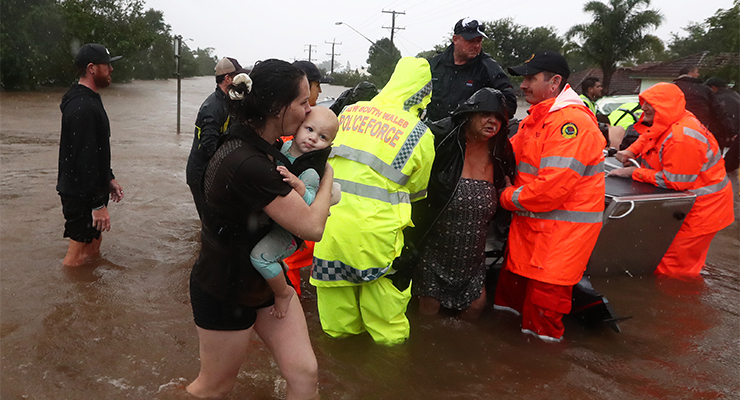
The heartbreak is just a window away. Any window in Queensland’s south-east is framing a story we’ve all seen before. Houses inundated. Families broken. Children separated from schools. Roads cut in half. Suburbs became islands as roads which had never flooded became rivers. Creeks became angry, spewing mud into businesses and homes.
But Brisbane’s big brown river that snakes through the city before emptying into Moreton Bay is the real villain again. It’s swallowed houseboats and cranes and ferry terminals, piers and pontoons, and is using them as weapons as it races downstream.
We didn’t see this coming, just as we didn’t see the murderous 2011 flood. Questions were asked then, and they’ll be asked again when the sun stays out and clothes begin to dry.
Why do we continue to build on floodplains? Do we have the right touch when it comes to letting water out of big storage dams? What can we learn so that we don’t keep recycling the same heartbreak every 10 years?
This time, for many, the loss is harder to cop. It comes after two years of COVID, where businesses and dreams were broken. Now many of those same people are losing their homes. Our children, whether they are six or 16, are living a COVID legacy that has stolen too much. Today many of them with gumboots to the knees are trying to retrieve school books and photographs of happier times.
Generosity to the fore
But in all this murky mess, there has been a delicious show of individual generosity that I haven’t witnessed before. Yes, in 2011 — when 36 people lost their lives — armies of volunteers made sandwiches and swept neighbours’ lounge rooms. But this time the kindness has spun out of social media. Late at night, those with a spare room have put their personal address on community groups and invited anyone struggling to simply turn up, at whatever time, for a hot cuppa and a bed for the night. No RSVP. No fanfare. The key will just be under the welcome mat.
Early in the morning, community Facebook groups have come alive with young tradies with their day’s work cancelled: “Hey, if anyone needs help cleaning up … or needs errands run, please reach out to me…’’
The offers are small but are fanning out across the city and state.
“Have a small group of mates; all with cars that may be able to help out,’’ one young man says. A mother needs medication delivered to the other side of town, and the rush of offers to collect the medicine, or buy it and deliver it, runs to dozens within minutes.
Those with dry offices, including politicians, opened them up for hot showers, to charge phones, collect dump vouchers and brewed coffee. Others who can drive safely on dry roads travel for two hours to strangers’ properties they see on the nightly news: “Thought you could do with a hand.’’
And by God, it’s welcome.
In another episode, a group of young workers rescued a man trapped by debris after his houseboat went down. They formed a human chain, linking arms. Strangers working together with a determination to save a stranger. And they pulled him to safety, just before other loose pontoons came hurtling down the river.
Even our leaders are showing a kindness missing from their everyday dialogue. Premier Annastacia Palaszczuk and Prime Minister Scott Morrison hunched over the same map, learning what challenge will come next and how best to solve it.
Yes, wars help incumbent prime ministers and floods can make a premier. But what we’ve seen this week is everyone pitching in — not for the rewards on offer, but because it’s the right thing to do.
It’s been a devastating lesson in the power of Mother Nature. And a fabulous lesson in the power of the human spirit.








The ABC can be relied on to churn out vast amounts of this sort of thing for every disaster – inspirational write-ups of the brave, heart-breaking descriptions of the misery and destruction, personal witness from those caught in the events, plenty of praise for the peerless emergency services. And so on. It is more or less the same every time, year in and year out, except the individual names will vary. Crikey, don’t try to take on the ABC on its home turf. It’s a waste of your time and effort and no service to your readers. And as others commenters have already mentioned, some analysis or context explaining why this crap is happening is far more significant. Along with why the defences were inadequate, why houses were placed in harms way, why disasters are always treated as one-off events nobody could predict,and so on.
No mention of any contributory cause such as capitalism-caused climate catastrophe? And “Mother” Nature as a misogynist cliche as well. Fail.
yeah, um, check out the enviro-disasters, caused by socialist states. not to mention massively inefficient power generation by corrupt socialist bureaucracies.
I find that when anthropomorphising, giving the planet, and nature, the female gender is kind, and reflects the creative power of woman and reflects the need of each of us humans for a strong maternal bond. I’m ok with it. How is it misogynist?
Not sure its Mother Nature (either floods of covid) so much as climate change denying Crony Corporatism.
Lovely little story, give it to New Idea or some such.
Politicians hunched over maps, pretending they don’t know what’s increasing the risk of extreme weather events – not so lovely. Crikey, what have you come to?
Thanks Madonna. I appreciate the angle that has been taken with respect to this story. This is because of the breadth and scale of compassion and effort needed by ordinary folk to cope with the vast and unprecedented losses experienced during this record breaking calamitous summer on the east coast. This, in the absence, of an adequate response effort from state and federal authorities. A story exploring what are now belatedly and tepidly admitted failures by the NSW state government in its response, as well as the federal response that’s needed in the the overarching reach of climate change would be appreciated.